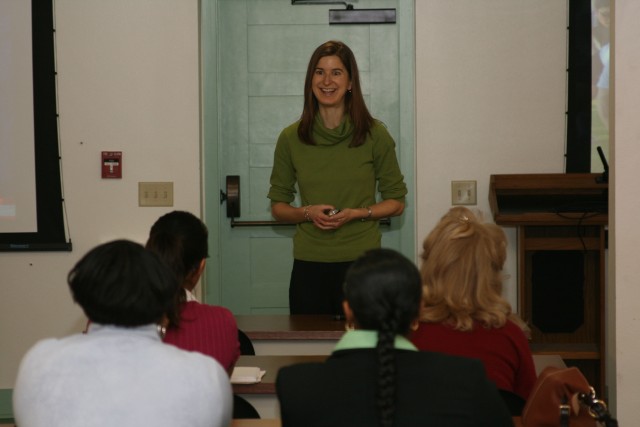FORT CARSON, Colo.-If there is any doubt that suicide is a growing national issue, proof can be found in an unsettling milestone reached by the National Suicide Prevention Lifeline Network.
The network logged its 1 millionth call in November since being established Jan. 1, 2005, by the Substance Abuse and Mental Health Services Administration.
The good news is that a million people decided to call the lifeline at 800-273-TALK (8255) to get help, but many others - including servicemembers- might not seek help because they view it as a sign of weakness.
"The stigma of suicide must go away," Maj. Gen. Mark A. Graham, commanding general, Division West (First Army) and Fort Carson, told reporters at a Jan. 21 press conference.
"This is not just an Army issue and concern. To me, it's a national concern. Suicide is throughout our nation, and the stigma of suicide is part of it."
Graham held the press conference to discuss the Jan. 16 suicide of a Fort Carson Soldier and also spoke about training conducted last week by a team from the Army's ACE (Ask, Care and Escort) Suicide Intervention Program.
Spc. Larry C. Applegate, Warrior Transition Unit - a decorated veteran who had served in Iraq - died from a self-inflicted gunshot wound.
"This young Soldier died fighting a different battle," Graham said. "He fought a battle in Iraq; (he) was a hero. He was awarded the Army Commendation Medal with V device for valor, received a Purple Heart and other medals - a great young Soldier doing great things for the nation. Sadly, he died by suicide fighting a different battle - I lost a son fighting a different battle to suicide - and we are saddened by it."
Graham's son, Kevin, a top ROTC cadet, committed suicide in 2003. Since then, Graham and his wife, Carol, have spoken out about the importance of seeking help and of recognizing the warning signs of suicide.
"We treat so many other things and so many other illnesses differently," he said. "But, with suicide, the stigma surrounding it causes us to oftentimes not ask the hard questions. 'How are you doing'' 'Are you sleeping well at night'' 'Are you having any problems'' 'Are you feeling bad'' 'How are you doing at work'' 'Are you able to focus''
"We've got to learn to ask those questions early on and get to know people we work with and live with and that we are around. So, we're not only just training our Soldiers to understand that, and our leaders, but also we're helping our Families to understand that so the Families can identify these things as well. I can promise you this, we are all working hard."
That work included bringing in a team from the ACE Suicide Intervention Program last week to conduct large-group training for about 1,500 Soldiers and test a pilot program that includes separate small group training sessions for Soldiers and Family members. The Soldiers' training sessions were conducted by social worker Dr. Jim Cartwright, and psychologist Dr. Kelly Forys led the Family-member sessions. The team also trained 42 chaplains and chaplains' assistants and Army Community Service social workers.
"Our headquarters did the morning large group ... and the feedback has been very positive," said Maj. Patrick Disney, operations officer for the 43rd Sustainment Brigade. "The Army is a very stressful place to serve nowadays. A young Soldier leaves home for the first time and has to go to Iraq or Afghanistan for a year or 15 months. They can see things there that are incredibly earth-shattering to a young man or woman. So, they have stresses that are above and beyond what some of your average citizens may see.
"To get them help to understand signs early is crucial. The training that involves a Soldiers life -that's the most important training we do in the Army."
The training for Family members is a pilot program designed to give Family members the skills to recognize suicidal behavior in their Soldiers, said Chap. (Maj.) Michael Frailey, brigade chaplain for the 43rd SB.
"To go along with the Biblical aspect, the wife or the spouse is the helpmate," he said. "It's good to have the (spouse) informed of what to look for and have the awareness of how to deal with the struggles and where to seek help."
The training also stresses to Soldiers that seeking help will not negatively affect their potential for promotions or schools.
"We've had senior leaders in our Army that have come forward and said that they themselves have gone and received treatment for post traumatic stress disorder," Graham said. "We're seeing more and more come out and say that they've gone forward. So, rank doesn't protect you from this.
"Our Army is working hard ... to help get rid of the stigma. People who come forward can still get promoted and still go to schools and can still move forward in the Army."
Graham said that things have changed in how the Army and society deal with suicide prevention.
"When I was a young person growing up, you didn't mention suicide. People were afraid if you talked about suicide it would cause a suicide," he said. "We know now that is not the case. Ask somebody; talk to somebody and see how they're doing. We can help people. There are great professionals out there that can help, and there are so many ways to do that - to get them assistance.
"We've got to get in front of this so we don't have more suicide. One suicide is too many."


Social Sharing